Uncategorized
20 Household Items That Are Toxic To Dogs
Published
11 months agoon

Shutterstock
As dog owners, it’s crucial to be aware of the everyday items and substances that can pose risks to our pets. Many common household items, foods, and plants are surprisingly toxic to dogs, causing anything from mild discomfort to severe health emergencies. Understanding what these items are and how they can affect your dog is essential for preventing accidental ingestions that can lead to serious consequences. This guide provides an overview of various substances that are harmful to dogs, helping pet owners create a safer environment for their furry family members.
Chocolate

Shutterstock
Chocolate is highly toxic to dogs due to its theobromine and caffeine content, both of which dogs are unable to metabolize effectively. Even small amounts of chocolate, especially dark chocolate or baking chocolate, can cause symptoms such as vomiting, diarrhea, rapid breathing, and seizures. In severe cases, chocolate ingestion can lead to heart arrhythmias and even death. Dog owners should keep chocolate securely out of reach of their pets and be aware of any chocolate-containing products in the home.
Xylitol

Shutterstock
Xylitol is a sugar substitute found in many sugar-free products, such as gum, candy, and some peanut butters. In dogs, xylitol can quickly release insulin, leading to potentially life-threatening hypoglycemia (low blood sugar). Symptoms of xylitol poisoning can appear within 10 to 60 minutes and include vomiting, weakness, lethargy, loss of coordination, seizures, and coma. If you suspect your dog has ingested xylitol, it is crucial to seek veterinary care immediately to prevent more severe complications.
Grapes and Raisins
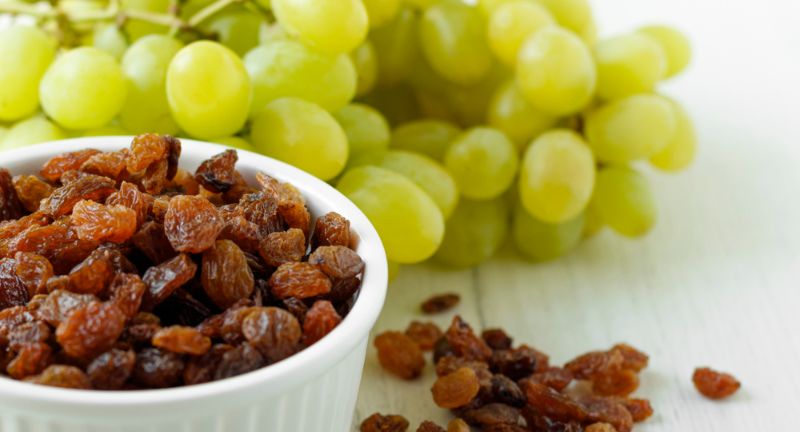
Shutterstock
Grapes and raisins, though healthy snacks for humans, are extremely toxic to dogs and can lead to acute kidney failure. Even a small amount can be dangerous, and the exact toxic dose varies widely between individual dogs. Symptoms of grape or raisin toxicity include vomiting, lethargy, diarrhea, and a decrease in urine production, progressing rapidly to kidney failure. Dog owners should avoid feeding these fruits to their pets and seek immediate veterinary attention if ingestion is suspected.
Onions and Garlic
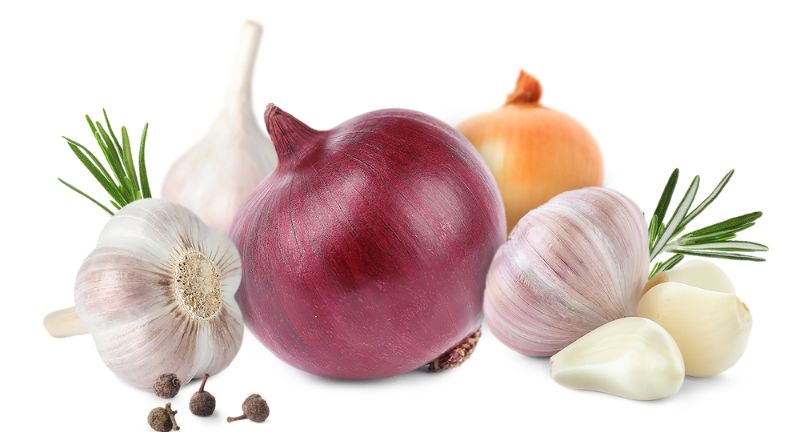
Shutterstock
Onions and garlic, including all members of the allium family, are poisonous to dogs, causing gastrointestinal irritation and potentially leading to red blood cell damage and anemia. This toxicity applies to these foods in all forms: raw, cooked, dried, or powdered. Symptoms from eating these can range from vomiting and diarrhea to more serious conditions such as breathlessness and lethargy. If a dog consumes a significant amount, it may require veterinary care for blood transfusions and supportive treatments.
Macadamia Nuts
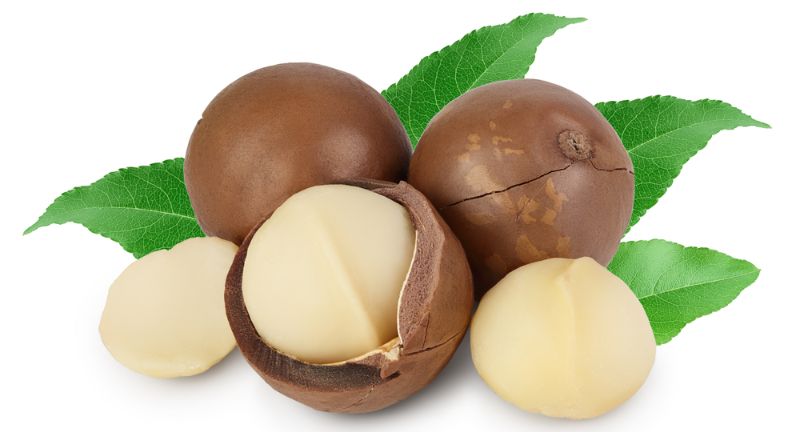
Shutterstock
Macadamia nuts are another common food that is harmful to dogs, causing symptoms such as vomiting, ataxia (loss of control of body movements), weakness, hyperthermia, and depression. These nuts contain an unknown toxin that affects the nervous system and muscles of dogs. Symptoms usually appear within 12 hours of ingestion and can last up to 48 hours. Immediate veterinary care is recommended if a dog ingests macadamia nuts, as supportive care may be necessary to help them recover.
Alcohol

Shutterstock
Alcohol is highly toxic to dogs, even in small quantities. It can cause vomiting, diarrhea, decreased coordination, central nervous system depression, difficulty breathing, tremors, acidosis, coma, and even death. Alcohol can be found in obvious products like beer, wine, and spirits, but also in surprising items like certain desserts and unbaked dough that ferments. Pet owners must keep all alcoholic beverages and substances out of reach of their dogs and seek immediate veterinary treatment if accidental ingestion occurs.
Coffee and Caffeine

Shutterstock
Caffeine in coffee and other beverages can be fatal to dogs, and there is no antidote. Symptoms of caffeine poisoning include restlessness, rapid breathing, heart palpitations, muscle tremors, fits, and bleeding. Even small amounts of coffee, tea, or caffeine-containing products can cause serious health issues in dogs. If you believe your dog has consumed caffeine, it is essential to contact your veterinarian or an emergency animal hospital immediately.
Avocado

Shutterstock
Avocado contains persin, a toxin that can cause vomiting and diarrhea in dogs. The risk is higher with the leaves, seeds, and bark of the avocado plant, but the fruit itself also contains this toxin. Additionally, the large pit poses a significant choking hazard and can cause an intestinal blockage if swallowed. While some dogs may handle small amounts of avocado flesh without issues, it is generally best to avoid feeding this fruit to dogs altogether.
Cooked Bones

Shutterstock
Cooked bones can be extremely dangerous for dogs, as they can splinter and cause severe internal damage or obstruction. These splinters can lead to painful and potentially fatal conditions such as punctures or blockages in the intestines. Raw bones are generally safer than cooked, but always consult with a veterinarian about safe bone and treat options for your dog. It is crucial to supervise your dog with any chew item, especially one that could break and become ingested.
Yeast Dough
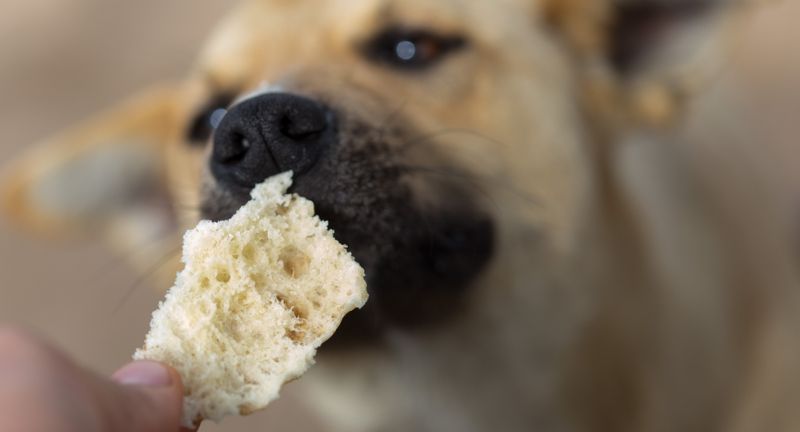
Shutterstock
Yeast dough can be dangerous to dogs if ingested. As the dough rises, it can expand in a dog’s stomach, causing severe pain and potentially leading to the rupture of the stomach or intestines. Additionally, as yeast ferments the dough to make it rise, it produces alcohol, which can lead to alcohol poisoning in dogs. If your dog eats yeast dough, it is imperative to get them to a vet immediately, as they may need medical intervention to prevent serious complications.
Human Medications
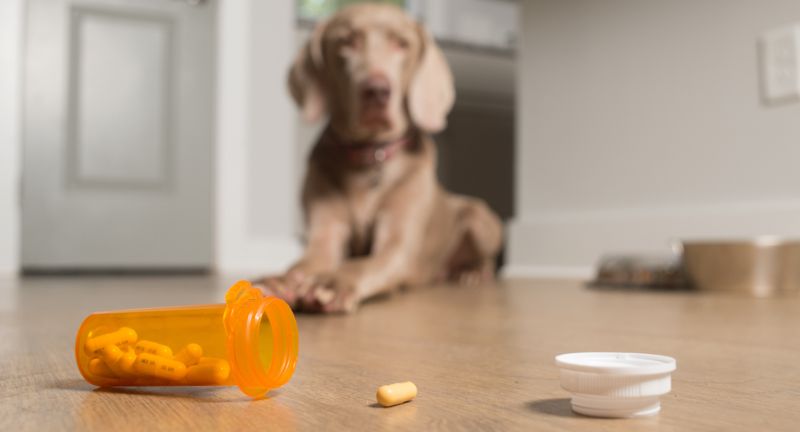
Shutterstock
Human medications, including over-the-counter and prescription drugs like ibuprofen, acetaminophen, and antidepressants, can be highly toxic to dogs. Even small dosages can lead to serious health issues such as gastrointestinal ulcers, kidney failure, and even death. Medications should always be kept out of reach, and never given to dogs without veterinary advice. If a dog accidentally consumes any human medication, it is critical to seek immediate veterinary care to address potential poisoning.
Peaches, Plums, and Persimmons
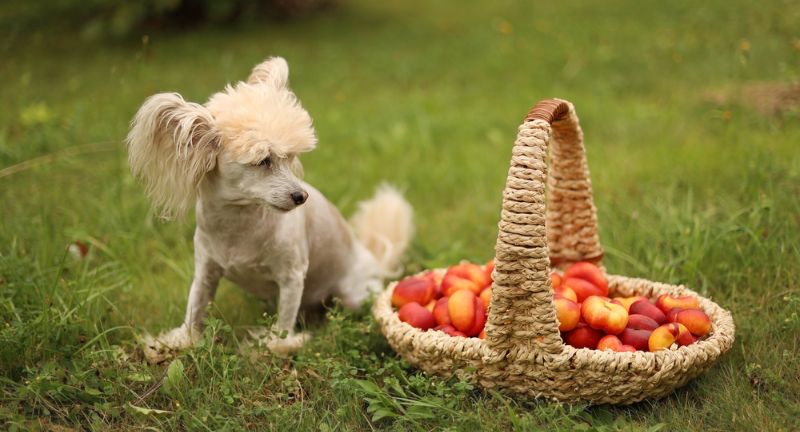
Shutterstock
Peaches, plums, and persimmons pose risks to dogs not only because their pits can cause intestinal blockages but also due to cyanide poisoning from the pits. The flesh of these fruits is not toxic to dogs; however, the pits can be hazardous if chewed and swallowed. Symptoms of an obstruction include vomiting, inability to defecate, and abdominal pain. Immediate veterinary attention is needed if a dog consumes the pits of these fruits to prevent severe complications.
Rodent Poisons
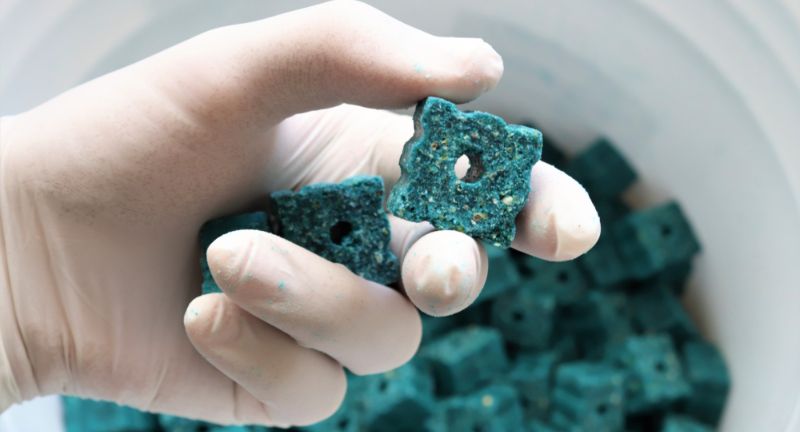
Shutterstock
Rodent poisons are extremely hazardous to dogs and can be lethal if ingested. These poisons are designed to kill rodents by causing internal bleeding, and they can have the same effect on dogs. Symptoms of poisoning include coughing, breathing difficulties, lethargy, and blood in urine or feces. If you suspect your dog has ingested rodent poison, it is crucial to seek veterinary care immediately to administer the appropriate treatment.
Cleaning Products
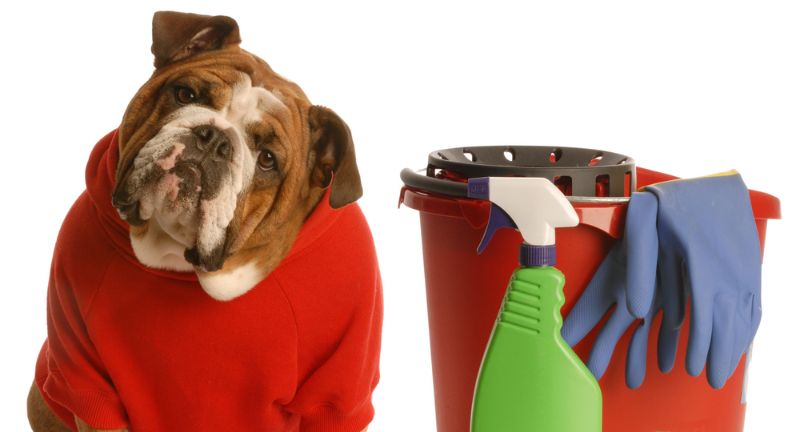
Shutterstock
Many common household cleaning products contain chemicals that are toxic to dogs, including bleach, ammonia, chlorine, and formaldehyde. These substances can cause severe gastrointestinal upset, respiratory distress, and chemical burns. Even exposure to fumes from these products can be harmful to a dog’s health. Always use cleaning products in well-ventilated areas away from pets, and store all chemicals securely out of reach.
Antifreeze

Shutterstock
Antifreeze, which contains ethylene glycol, is a common but deadly poison for dogs, often due to its sweet taste that attracts animals. Ingesting even a small amount can lead to kidney failure and death within days. Symptoms of antifreeze poisoning include acting drunk or uncoordinated, excessive thirst, and lethargy. It is imperative to keep antifreeze securely stored and clean up any spills immediately; if ingestion is suspected, treat it as an emergency and get veterinary help right away.
Lilies
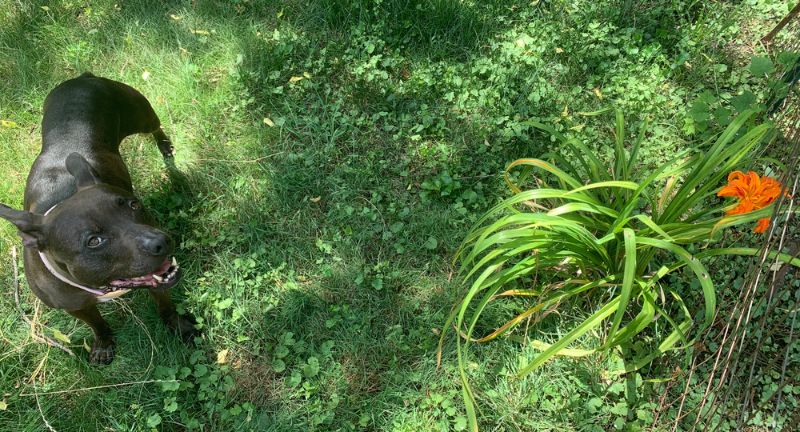
Shutterstock
Lilies are particularly toxic to dogs, with certain types such as true lilies (Easter, Tiger, Asiatic) and daylilies causing severe kidney failure. All parts of the lily plant are toxic, and ingestion of even small amounts can lead to serious health issues. Symptoms include vomiting, lethargy, and lack of appetite. Immediate veterinary intervention is crucial to manage poisoning in dogs, which can include intravenous fluids and medications.
Sago Palm

Shutterstock
The Sago Palm is highly toxic to dogs, with all parts of the plant being dangerous, but the seeds or “nuts” contain the highest amount of toxins. Ingestion can cause vomiting, diarrhea, liver failure, and potentially death. Symptoms can appear within 15 minutes or several hours after ingestion and require urgent veterinary care. It’s important for pet owners to recognize the plants within and surrounding their home and ensure their pets do not have access to them.
Tobacco

Shutterstock
Tobacco products, which contain nicotine, are extremely toxic to dogs. Symptoms of nicotine poisoning can include vomiting, abnormal heart rate, tremors, weakness, and collapse. In severe cases, it can lead to death. Pet owners should keep cigarettes, cigars, nicotine patches, and e-cigarette materials out of reach of dogs at all times to prevent accidental ingestion.
Household Plants

Shutterstock
Many household plants are toxic to dogs and can cause a range of symptoms from mild nausea and vomiting to severe poisoning effects, depending on the plant. Common toxic plants include philodendrons, dieffenbachias, and pothos. Symptoms can vary widely but often include drooling, vomiting, difficulty swallowing, and irritation of the mouth, lips, and tongue. It is important for dog owners to research and ensure that their indoor and outdoor plants are safe for pets.
Insecticides
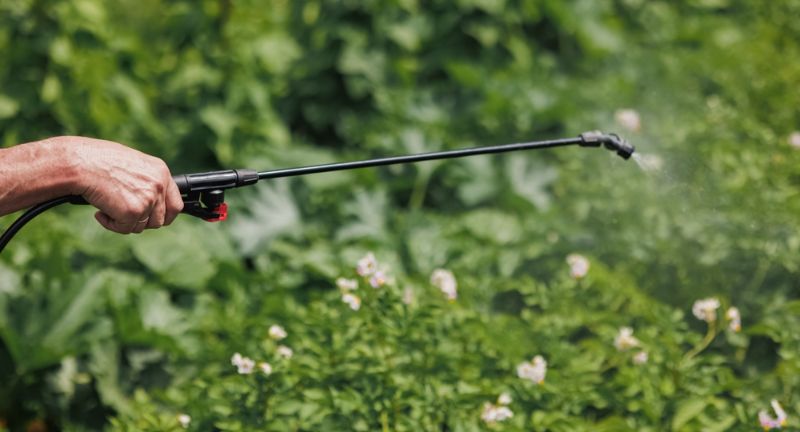
Shutterstock
Insecticides commonly used in homes and gardens can be toxic to dogs if ingested or even if they come into contact with treated surfaces. Symptoms of insecticide poisoning in dogs include drooling, vomiting, diarrhea, excessive tearing, muscle tremors, and, in severe cases, seizures or death. It’s crucial to use pet-safe insecticides and to keep pets away from treated areas until they are dry or as instructed by the product’s safety label. If you suspect your dog has been poisoned by an insecticide, immediate veterinary care is necessary.
Conclusion

Shutterstock
As responsible pet owners, it is our duty to ensure the safety and well-being of our dogs by keeping them away from harmful substances. Knowledge of what items can pose dangers allows us to prevent accidental ingestions that can lead to health crises. Always monitor your pet’s environment, be vigilant about what you leave within their reach, and educate yourself and your family about the risks various substances pose. If you suspect your dog has ingested something toxic, do not wait for symptoms to appear; contact your veterinarian or an emergency pet clinic immediately. By taking these precautions, we can provide a safe and loving home for our dogs, ensuring they live long, healthy lives.
ADVERTISEMENT - CONTINUE BELOW
About Local NewsX
Local News X is your go-to destination for comprehensive coverage of local news and events in your community, delivering stories that matter most to you right at your fingertips. From breaking news updates to in-depth investigations and heartwarming profiles of your neighbors, Local News X is dedicated to providing you with the information you need to stay connected and informed about what's happening in your local area.
ADVERTISEMENT
ADVERTISEMENT


NEWS2 months ago
20 of the Best Grocery Stores in 2025
Grocery shopping is an essential part of daily life, and finding the right store can transform a routine errand into...


NEWS2 months ago
20 Clear Signs You Are Likely To Be Unhappy In Retirement
Retirement is often seen as the reward for decades of hard work, but it doesn’t always bring the happiness people...


NEWS2 months ago
The 20 Unhealthiest Foods In America Today
While the U.S. offers a wide variety of delicious food, many popular items are loaded with unhealthy ingredients. High sugar...


NEWS2 months ago
22 Old Social Norms Which Are Now Ridiculous
Society has evolved significantly over the past century, and with it, many outdated social norms have been left behind. While...




